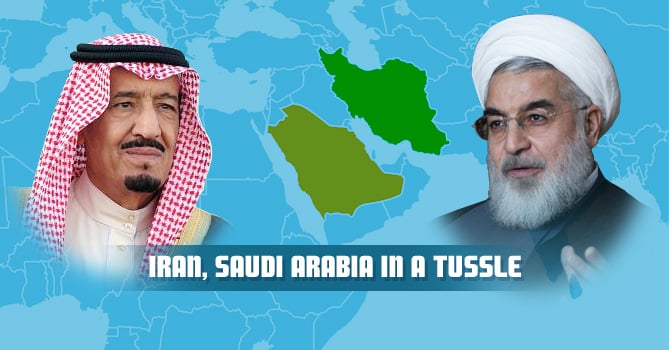Relations between Saudi Arabia and Iran have reached an all-time low with the recent execution of prominent Shia cleric Sheikh Nimr al-Nimr by the Saudi authorities. The execution was severely criticized by Iran, which said Saudi Arabia will face divine revenge for its actions and angry protestors in the country in a violent display of passions set the Saudi Embassy in Tehran on fire. Saudi Arabia, in turn, responded by snapping diplomatic relations with Iran and has asked the country’s diplomats to exit Riyadh within 48 hours.
Execution of Sheikh Nimr al-Nimr and escalation of tensions
Sheikh Nimr al-Nimr was a prominent Shia cleric and a strong supporter of the mass anti-government protests that took place in 2011 in Saudi Arabia’s Eastern Province. The cleric was arrested in 2012 during which he was also shot.
The oil-rich Eastern Province has a Shia majority who complain of marginalization by the Sunni royal family. In October 2014, the cleric was sentenced to death for seeking ‘foreign meddling’ in the kingdom along with ‘disobeying’ its rulers and taking up arms against the security forces.”
The execution of the cleric on January 2, 2016, sparked protests in Iran which spilled over to other countries like Bahrain, Pakistan and Lebanon. In Iran, protestors stormed the Saudi embassy and threw petrol bombs. Saudi Arabia’s consulate in the second biggest city of Iran, Mashhad, was also set on fire. The police moved in Tehran and cleared protestors from the embassy. Around 40 protestors were arrested.
A long history of troubled relations
Saudi Arabia and Iran have a history of troubled relations. The two countries are on the opposing sides in the Syrian war with Iran backing the Bashar al-Assad government and Saudi Arabia supporting the US-led coalition which is aiming to destabilize the government of the Syrian President. In a reference to the deteriorating relation, Iran was not included in the list of the Muslim coalition which Saudi Arabia had announced to take on the might of the ISIS. Iran has also criticized Saudi Arabia’s handling of the 2015 Hajj, which led to the stampede in Mina near the Holy city of Mecca, leading to deaths of more than 2,000 pilgrims. Iran claimed to have lost 464 of its citizens in the tragedy. Earlier, too, diplomatic ties were severed between the two nations between 1988 and 1991.
The US and Western concerns
The Middle East is a hotbed of conflict and the escalation of tensions between the two dominant powers in the region is a worrying factor for the United States which is leading a coalition of nations against the ISIS.
In an effort to ease the simmering tensions, US officials were pursuing high-level talks with both the countries. Meanwhile, European countries, too, are alarmed over the recent developments and the executions and deteriorating relations have witnessed a flurry of diplomatic calls from Europe. Condemning the execution, the foreign ministry of France has called upon the religious leaders to do everything possible to decrease tensions in the region. Meanwhile, the foreign policy chief of the EU, Federica Mogherini spoke separately with Adel al-Jubeir, foreign minister of Saudi Arabia, and Javad Zarif, foreign minister of Iran.
Latest Developments
Saudi Arabia, Iran relations: Tension spreads
The tensions between Iran and Saudi Arabia have begun to spread to other countries in the Middle East. Bahrain followed in Saudi Arabia’s footsteps and on Monday announced that it would be severing diplomatic relations with Iran. Bahrain has cited Tehran’s blatant and dangerous interference in the country as well as other Arab nations as the reason to snap diplomatic relations.
The UAE, which recalled its ambassador in Tehran, said it was downgrading its diplomatic relations with the country. Sudan has also expelled the Iranian diplomatic mission in the country and also recalled its ambassador on the grounds of an Iranian interference in the region through a sectarian approach. Kuwait is the latest country to recall its ambassador from Iran.
The deterioration of relations between the two countries have alarmed many nations around the world. China and Russia released statements calling for restraint.

